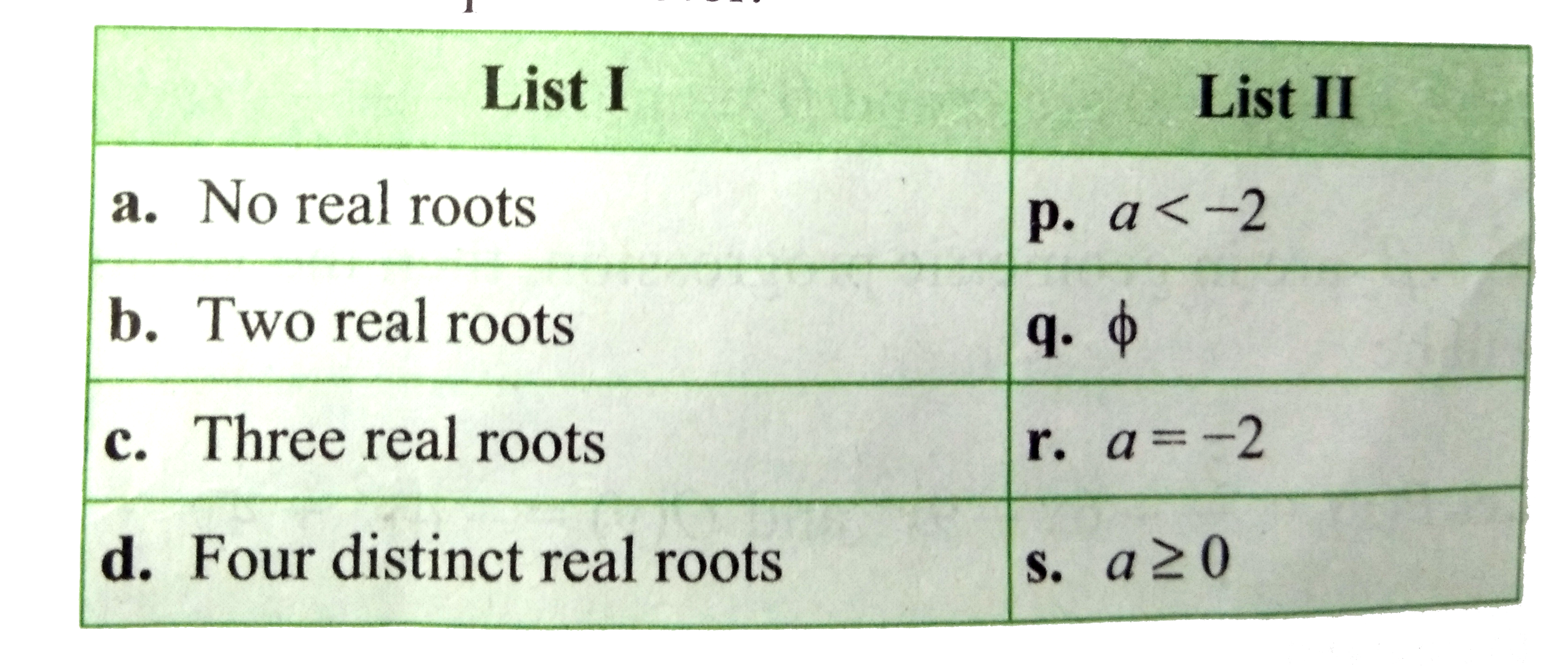If a,b,c∈Randabc<0 , then equation bcx2+2(b+c−a)x+a=0has (a)both positive roots (b)both negative roots (c)real roots (d)one positive and one negative rootSolution in Tamil
both positive roots
both negatie roots
real roots
one positive and one negative root
The correct Answer is:3,4
Product of roots is
abc<0[∵abc<0]
Hence, roots are real and of opposite sign.
Topper's Solved these Questions
- THEORY OF EQUATIONSBOOK - CENGAGECHAPTER - THEORY OF EQUATIONSEXERCISE - Exercise (Comprehension)
37 Videos
- THEORY OF EQUATIONSBOOK - CENGAGECHAPTER - THEORY OF EQUATIONSEXERCISE - Exercise (Matrix)
6 Videos
- THEORY OF EQUATIONSBOOK - CENGAGECHAPTER - THEORY OF EQUATIONSEXERCISE - Exercise (Single)
89 Videos
- STRAIGHT LINESBOOK - CENGAGECHAPTER - STRAIGHT LINESEXERCISE - JEE Advanced Previous Year
4 Videos
- THREE DIMENSIONAL GEOMETRYBOOK - CENGAGECHAPTER - THREE DIMENSIONAL GEOMETRYEXERCISE - Question Bank
12 Videos
Similar Questions
Consider an unknow polynomial which divided by (x−3) and (x−4) leaves remainder 2 and 1, respectively. Let R(x) be the remainder when this polynomial is divided by (x−3)(x−4).
If equations R(x)=x2+ax+1 has two distint real roots, then exhaustive values of a are.
View SolutionMatch the following for the equation x2+a|x|+1=0 where, a is a parameter.

View SolutionThe value of expression x4−8x3+18x2−8x+2 when x=2+√3
View Solutionabout to only mathematics
View SolutionThe equation of the plane which has the property that the point Q(5,4,5) is the reflection of point P(1,2,3) through that plane, is ax+by+cz=d where a,b,c,d∈N. Find the least value of (a+b+c+d).
View SolutionIf a,b,c∈R and abc<0 , then equation bcx2+(2b+c−a)x+a=0 has (a). both positive roots (b). both negative roots (c). real roots (d) one positive and one negative root
View SolutionIf positive numbers a,b,c are in H.P., then equation x2−kx+2b101−a101−c101=0(k∈R) has (a)both roots positive (b)both roots negative (c)one positive and one negative root (d)both roots imaginary
View SolutionBoth the roots of the equation (x−b)(x−c)+(x−a)(x−c)+(x−a)(x−b)=0 are always (1980, 1M) positive (b) negative (c) real (d) none of these
View Solutiona>b>0 and 2x^(2)-ax-b^(2)=0t h e n(A) both roots lie between -(a)/(2) and a (B) both roots are positive (C) both roots are negative (D) both roots are imaginary
View SolutionIf (a+b+c)>0 and a < 0 < b < c, then the equation a(x-b)(x-c)+b(x-c)(x-a)+c(x-a)(x-c)=0 has (i) roots are real and distinct (ii) roots are imaginary (iii) product of roots are negative (iv) product of roots are positive
View SolutionIf a,b,cεRandab>0,a+2b+4c=0 then equation ax2+bx+c=0 has (A) both roots positive (B) both roots negative (C) one positive and one negative root (D) both roots imginary
View SolutionBoth the roots of the equation (x−b)(x−c)+(x−a)(x−c)+(x−a)(x−b)=0 are always a. positive b. real c. negative d. none of these
View SolutionIf a,b,c∈R and abc<0 , then equation bcx2+(2b+c−a)x+a=0 has (a). both positive roots (b). both negative roots (c). real roots (d) one positive and one negative root
View SolutionIf positive numbers a,b,c are in H.P., then equation x2−kx+2b101−a101−c101=0(k∈R) has (a)both roots positive (b)both roots negative (c)one positive and one negative root (d)both roots imaginary
View SolutionIf positive numbers a,b,c are in H.P., then equation x2−kx+2b101−a101−c101=0(k∈R) has (a)both roots positive (b)both roots negative (c)one positive and one negative root (d)both roots imaginary
View Solution
